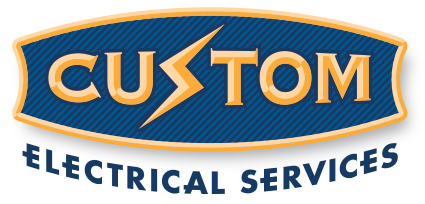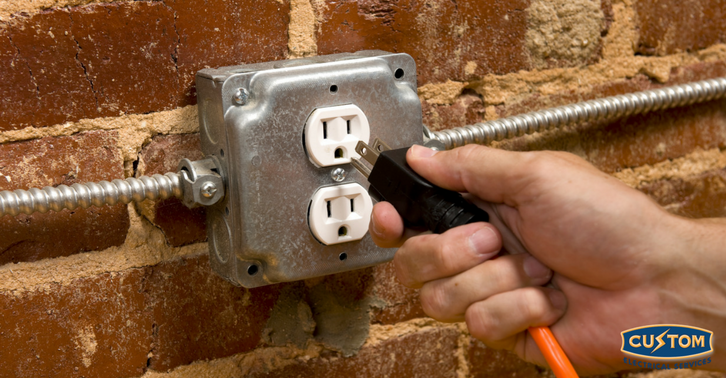
What’s the Problem?
Most of the time, this isn’t a problem. Extension cords function exactly as their designed to. When you need a longer cord to place a fan or give a little extra reach to your vacuum cleaner, there’s nothing dangerous going on. Where extension cords become risky is in their overuse. Many people buy the longest, cheapest cord they can find and this is where danger sets in.
Electricity and metal have a very interesting relationship. As current, the flow of electricity over a conductor, increases in a wire, the temperature increases. Current is also adjusted as resistance increases to keep power at the same level. When you add wiring to a circuit, the resistance of the wire itself stacks with the rest of the components on that circuit. While one electrical cord doesn’t add much in the way of resistance, multiple cords will continue to increase the amount of power being used in the system. As the current increases to keep up with the new demand, the temperature in the wiring also increases.
This relationship is used to great effect in your circuit breaker, where the difference in heat forces a breaker trip that protects your system. In an extension cord that isn’t designed to handle the load being placed on it, insulation melts and fires can start.
When to Use an Extension Cord
Keep in mind that extension cords are always temporary. Never use an extension cord for anything permanent. They are designed to help you reach electricity for a task and nothing more. When in doubt (or if you hear buzzing coming from the wiring, socket, or circuit breaker) switch to a higher amperage circuit and a lower gage wire for your extension cord (the lower the gage, the thicker the wire and the more current it will be able to handle).
According to the Electrical Safety Foundation International, Guidelines for using an extension cord are as follows:
- Don’t attempt to plug extension cords into one another
- Make sure extension cords are properly rated for their intended use, indoor or outdoor, and meet or exceed the power needs of the device being used
- Keep all outdoor extension cords clear of snow and standing water
- Do NOT overload extension cords
- A heavy reliance on extension cords is an indication that you have too few outlets to address your needs. Have additional outlets installed where you need them
- Inspect cords for damage before use. Check for cracked or frayed sockets, loose or bare wires, and loose connections
- Do NOT nail or staple extension cords to walls or baseboards
- Do NOT run extension cords through walls, doorways, ceilings, or floors. If a cord is covered, heat cannot escape, which may result in a fire hazard
- Never use three-prong plugs with outlets that only have two slots. Never cut off the ground pin to force a fit, which could lead to electric shock
- Buy only cords that have been approved by an independent testing laboratory
- Do NOT substitute extension cords for permanent wiring
- Do NOT use an extension cord or power strip with heaters or fans, which could cause cords to overheat and result in a fire
Remember that the more power you need, the more current you’ll be using. Any device that includes a motor or heating element will either need an industrial-grade extension cord (power tools) or should not be used with an extension cord at all.
For the best in quality electrical repair work and installations, contact the professionals at Custom Electric! Be sure to check back here each week for helpful advice, news, and guides or follow us on Facebook and Twitter!



